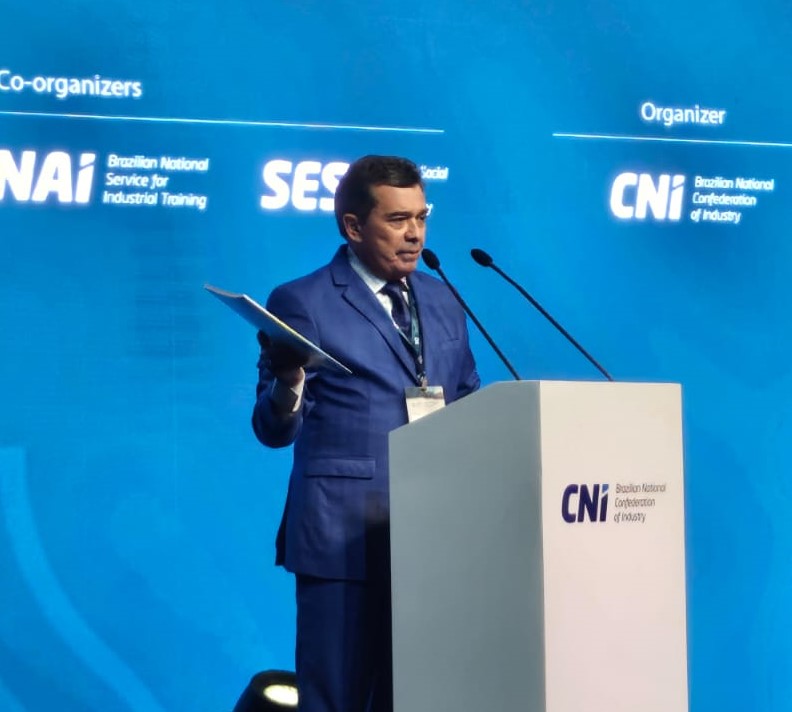“Brazil on the Path to Become a Global Leader in Green Economy," says Minister Vital do Rêgo
Discussions on Low-Carbon Economy and Energy Transitions Mark the TCU’s Participation in COP29
By Secom / Serint
During the 29th United Nations Climate Change Conference (COP29), being held from November 11 to 22, 2024, in Baku, Azerbaijan, the Brazilian Federal Court of Accounts (TCU) has participated in a series of activities, playing a strategic role in reaffirming its commitment to the global climate agenda and the transition to a low-carbon economy.
Minister Vital do Rêgo, the Vice President of the TCU, represented the institution at various events, contributing to critical discussions for Brazil. He emphasized the importance of integrated oversight and policies that support a sustainable future, highlighting the role of Supreme Audit Institutions (SAIs) in promoting transparency and integrity in climate action.

Low-Carbon Economy
On November 14, the TCU participated in the seminar "Business Dialogue for a Low-Carbon Economy," organized by the National Confederation of Industry (CNI). During the panel, Minister Vital do Rêgo highlighted that recent Climate Conferences (COPs) demonstrate an increasing global commitment to balancing economic development with sustainability. "The notion that economic growth and environmental protection must be at odds can no longer exist," stated the Minister, stressing that this perspective has evolved, fostering a new era of integration between these two pillars.
Addressing the strategic role of the Amazon, Minister Vital do Rêgo highlighted the biome's wealth and complexity, noting that it covers approximately 65% of Brazil’s territory and is home to over 28 million people, including 60% of the country’s Indigenous population. “Brazil can move beyond being merely a commodity exporter and take on a global leadership position in the green economy agenda,” he stated, referencing the proposed legislation regulating Brazil’s carbon market, which is advancing in the National Congress. He believes that using this ecosystem in a sustainable way, which is valued at up to BRL 1 trillion each year, can create significant economic opportunities and lead to social progress for the country.
Minister Vital do Rêgo also stressed the importance of a “neo-industrialization” in Brazil, combined with greater social responsibility among Brazilian businesses, which today are showing increased awareness of the environmental impact of their actions.

“We are witnessing a transformation in the profile of Brazilian entrepreneurs, who now understand that their future depends on the actions they take today," he declared.
He further pointed out that a strong alliance between the business sector, government, and civil society is essential for the success of a low-carbon economy.
The Minister also reaffirmed the TCU's role in overseeing sustainability initiatives, asserting that the institution will continue auditing and monitoring climate-related public policies to ensure Brazil advances towards a sustainable economy and global leadership in the green economy agenda.

Industrial Sector and the Climate Agenda
On the TCU’s first day of participation, Vital do Rêgo attended the opening of the National Confederation of Industry (CNI) pavilion. CNI representatives emphasized the importance of building consensus in Brazil's industrial sector to strengthen progress toward the Paris Agreement. The Vice President of the TCU highlighted the significance of these actions in consolidating Brazil's green economy and the TCU’s role in monitoring industrial practices aimed at sustainability. He stressed the importance of audit institutions in overseeing decarbonization projects to promote greater transparency and efficiency in value chains.
During the event, Minister Vital do Rêgo introduced the Practical Audit Guide for Energy Transitions, a document designed to assist other Supreme Audit Institutions in monitoring and evaluating government actions. The guide, based on TCU’s audits in Brazil, consolidates methodologies and best practices for auditing the sector.
CNI presented initiatives on decarbonization and energy transition, addressing topics such as renewable energy use and circular economy practices, which are critical for meeting Brazil’s climate goals.
COP30: Amazon Consortium
The Interstate Consortium of the Amazon Region took centre stage at COP29 with the “Baku to Belém” initiative, aimed at preparing leaders and global stakeholders for COP30 by placing the Amazon at the heart of climate discussions. Minister Vital do Rêgo, alongside Pará Governor Helder Barbalho, reinforced TCU’s commitment to Amazon sustainability and stressed the institution’s role in ensuring transparency in public policies for environmental protection. "The Amazon is not just a region—it is a diversity of peoples, cultures, and ecosystems. Our task is to respect this complexity and honour the responsibility we carry with every decision," he remarked.
The Amazon Consortium’s agenda prioritized topics such as climate financing and green infrastructure, which are essential for the region’s sustainable development. Climate financing is expected to be a central theme at COP30, with Brazil leading discussions on the New Collective Quantified Goal (NCQG), set to replace the previous target of $100 billion.
During COP29, TCU also held bilateral meetings with the Azerbaijani oversight institution and the Inter-American Development Bank (IDB).